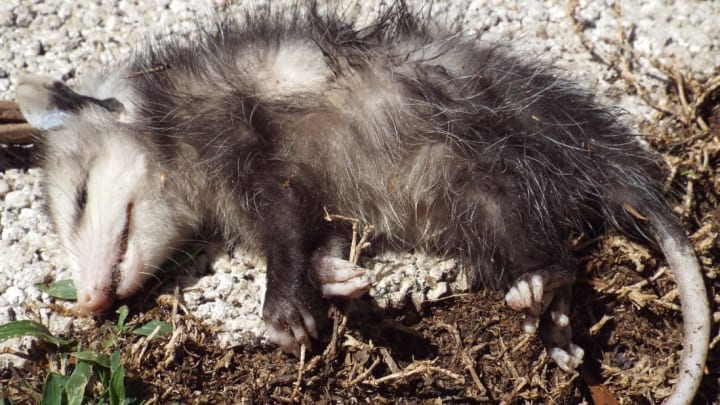Fight or flight are cited as the two most common responses animals have to immediate threats. But there's a third reaction that will seem familiar to anyone who's seen a "dead" possum spring to life: In the face of danger, some animals will enter a tonic state as a last-ditch shot at survival. Assuming a vulnerable, motionless position may seem like the worst way to get out of an emergency situation intact—but "playing dead" can be a life-saving behavior.
According to World Atlas, feigning death, or thanatosis, is most often used as a strategy to avoid becoming a meal. When some animals feel threatened, their systems become overloaded with fear and they enter a coma-like state. If a predator is looking for live prey and finds an apparent—and possibly diseased—corpse instead, it may lose interest, leaving its would-be victim to live another day.
Some animals do more than flop onto the ground to turn off predators. Opossums sell their performance by releasing a foul odor during thanatosis that suggests they've been rotting for days. The southern hog-nose snake uses a similar, smelly defense mechanism while laying motionless, and has also been known to spit up blood, according to National Geographic. Some creatures change their appearance in a tonic state: The undersides of the fire-bellied frogs of Asia and Europe flush bright orange and yellow to signal to predators that they're toxic.
Thanatosis is also used as a way to get closer to prey, though such cases are rare. Livingston’s cichlid, a fish native to Lake Malawi in East Africa, sinks to the lake bed and waits for unsuspecting fish to swim by it before going in for the kill. Playing dead can also be used as a mating strategy. The courtship ritual of the nursery web spider involves a male spider offering a silk-wrapped insect to a female. Sometimes the female attempts to snatch away the present and leave the male behind. To avoid this, the male plays dead and allows himself to be dragged along with the package as the female tries to run. He revives himself when the female starts to feed.
Thanatosis is observed across the animal kingdom, from invertebrates to mammals. It has provided an evolutionary advantage to many creatures, but it isn't always a guarantee of survival. An opossum that freezes up at the sight of an incoming car, for example, is likely to become roadkill.
